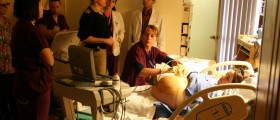
Prenatal tests such as the "early screen" are routinely offered to pregnant women who are under the care of obstetricians/gynecologists. If you are anything like me, your first reaction might be something like of course I want to get all the information I can about my unborn baby! When it comes to screening tests, you do have to take into account that it is possible to get false positives. These will have you worried there is something wrong with your baby when in truth, everything is fine. It can cause a lot of stress. Diagnostic tests can carry the risk of miscarriage or preterm labor (see amniocentesis what it is, and how it works) Let's take a look at the types of testing available.
Screening tests. Ultrasounds and blood tests both fall into this category, and they are pretty routine. Screening for abnormal chromosomes does not pose a direct risk to a fetus, and is offered to anyone who is deemed to have an increased risk. This includes a family history of chromosomal abnormalities and advanced maternal age (over 35). False positives are not uncommon, and they can cause a lot of stress. Diagnostic tests. These will give more definite results, but they do come with risks. An amniocentesis puts you at risk of miscarrying, or preterm labor if you are further along in your pregnancy.Before having prenatal testing, you should ask yourself what you want the information for. If your baby was found to have a birth defect, would you terminate the pregnancy? If not, do you want to have the knowledge to prepare better for a baby with special needs? There are no right or wrong decisions. Deciding whether to have prenatal testing is a highly personal choice.








_f_280x120.jpg)








Your thoughts on this
Loading...